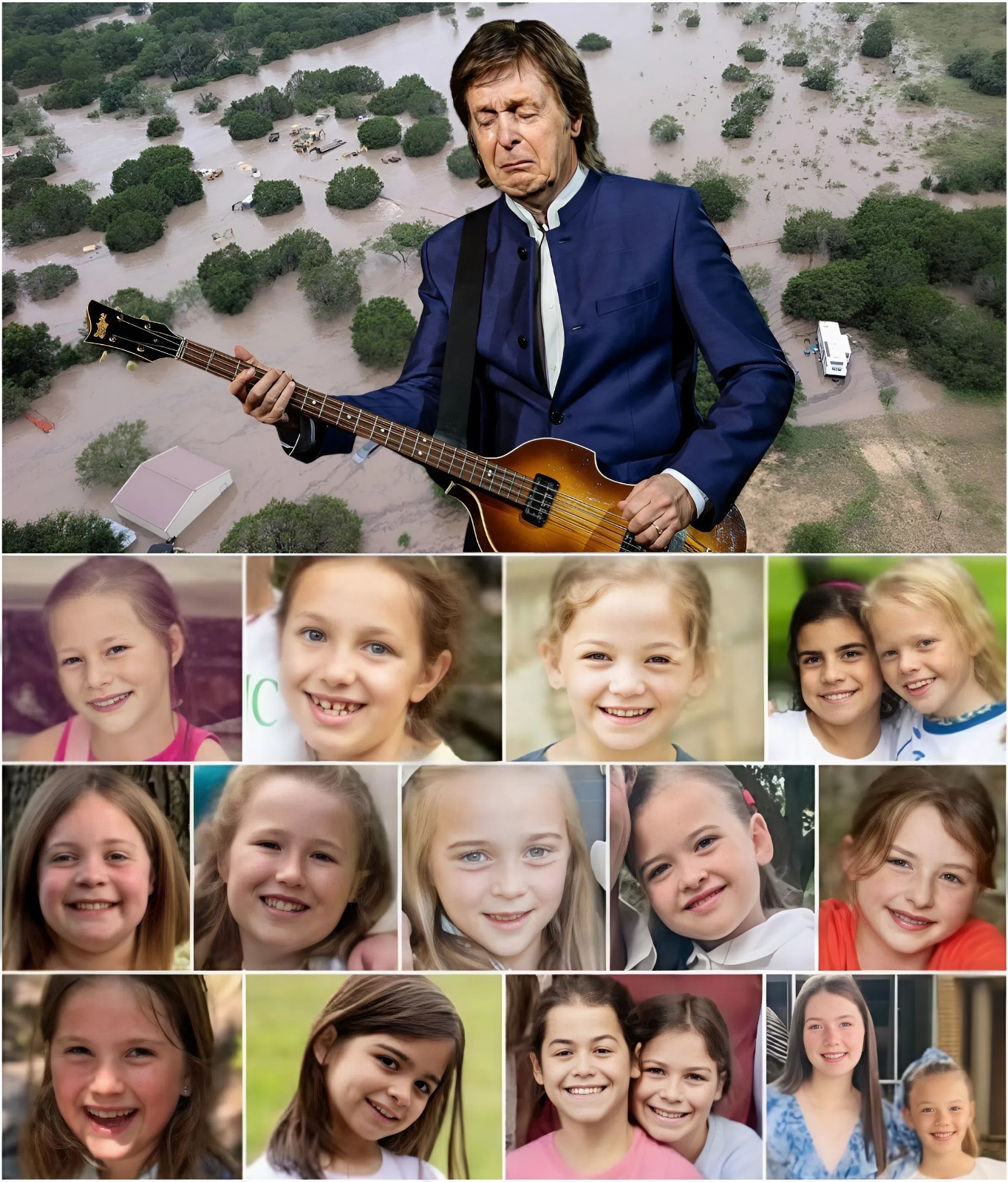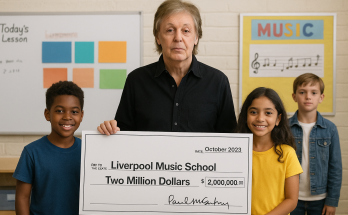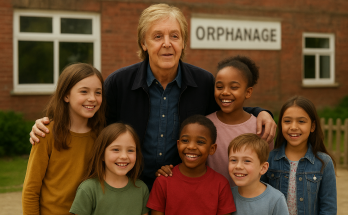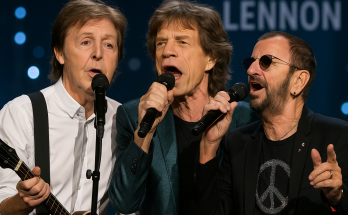Paul McCartney: A Legend of Music, Humanity, and Compassion
Paul McCartney is one of the most influential musicians in history. As a member of The Beatles, he helped redefine the sound of rock and roll, shaping the music industry in ways few could have ever imagined. His voice, songwriting, and musicianship have earned him countless accolades, but it is his compassion and humanity off the stage that set him apart from others in the entertainment world. McCartney has always demonstrated that his success is not just about his musical accomplishments but about using his platform to make the world a better place. His recent acts of kindness and charitable work showcase his commitment to making a positive impact on society.Early Life and Musical Beginnings
Paul McCartney was born on June 18, 1942, in Liverpool, England. Raised in a working-class family, McCartney was exposed to music at a young age. His father, Jim, was an amateur musician who played the trumpet, and McCartney’s early interest in music came from him. McCartney taught himself how to play the guitar and quickly began to show his talent for songwriting.
By 1957, McCartney formed a band called The Quarrymen, which would eventually evolve into The Beatles, one of the most successful and influential bands of all time. McCartney met John Lennon in 1957, and they soon began writing songs together, creating some of the most iconic music in history. With The Beatles, McCartney’s music became a global phenomenon. Along with Lennon and George Harrison, McCartney wrote and performed songs that are still cherished to this day, including “Hey Jude,” “Let It Be,” and “Yesterday.”
The Beatles Era and Global Stardom
The Beatles, with McCartney as one of the main driving forces behind their music, revolutionized popular music in the 1960s. Their experimentation with new sounds, lyrical themes, and recording techniques paved the way for future generations of musicians. Albums such as Sgt. Pepper’s Lonely Hearts Club Band and The White Album became cultural landmarks, and McCartney’s contributions to these works were instrumental in shaping the direction of modern music.
As the band’s popularity grew, so did McCartney’s fame. However, the intense pressure of being in The Beatles, combined with the band’s growing creative differences, led to their eventual breakup in 1970. McCartney went on to pursue a solo career, and his first album, McCartney (1970), was a success. He later formed the band Wings, which enjoyed great success throughout the 1970s and early 1980s with hits like “Maybe I’m Amazed” and “Band on the Run.”
Throughout his solo career, McCartney continued to release albums and singles that resonated with fans worldwide. His versatility as a musician and songwriter allowed him to experiment with different styles, from classical music to rock and pop, all while maintaining his unique voice and emotional depth.
Philanthropy and Charitable Efforts
Despite his immense success, McCartney’s personal life has remained relatively humble, and he has consistently used his influence to support various causes. Known for his dedication to animal rights, McCartney has been an outspoken advocate for vegetarianism and the ethical treatment of animals. He has been involved with PETA (People for the Ethical Treatment of Animals) for years and has made several public statements and campaigns advocating for the protection of animals from cruelty.
In addition to his advocacy for animals, McCartney has been involved in various other philanthropic efforts. He has supported causes like poverty alleviation, cancer research, and disaster relief. One of his notable charitable acts came in response to the aftermath of Hurricane Katrina in 2005. McCartney donated millions of dollars to help rebuild the affected communities, and he performed at benefit concerts to raise awareness and funds for those impacted by the disaster.
In recent years, McCartney has also been involved in efforts to support children’s health and education, as well as organizations like the American Cancer Society. His donations, along with his public support for various causes, have made McCartney a figure who not only inspires through his music but also through his dedication to improving the lives of others.
A Heartfelt Response to Tragedy
One of the most poignant examples of McCartney’s compassion came during a recent natural disaster in Texas. In the wake of devastating floods that took over parts of Texas, McCartney felt compelled to respond. The floods, which claimed more than 100 lives, included 27 young girls who were attending a summer camp at Camp Mystic in Kerr County, Texas. The loss was overwhelming, and many families were left to mourn the deaths of their loved ones.
Upon hearing about the tragedy, McCartney was deeply moved. Though he was thousands of miles away from the devastation, he knew that his influence could make a difference. He immediately donated $3.5 million to help the families of the victims and the first responders who had been working tirelessly to save lives. His donation was not just financial—it was a symbol of his deep empathy for those affected by the disaster.
However, McCartney’s response went beyond monetary contributions. He turned to what he knew best—music. Disappearing into a small studio near Austin, McCartney recorded a raw, unpolished version of his song “Tell That Angel I Love Her.” The song, performed with just his guitar and voice, became an emotional tribute to those affected by the flood. The rawness of the recording, stripped of all production value, resonated deeply with listeners. It wasn’t polished, but it was real. It captured the pain and grief that many were feeling, and it provided comfort to those struggling to process their loss.
A Legacy of Compassion
Paul McCartney’s charitable acts, including his donation to the flood victims in Texas and his heartfelt music, serve as a reminder that true greatness goes beyond success and fame. His legacy is not just in the music he created, but also in the way he has used his platform to make the world a better place. McCartney has always believed in the power of compassion, and his actions show that he is as committed to helping others as he is to his music.
In a world that often focuses on self-interest and material gain, McCartney stands as an example of how one person’s kindness and generosity can make a significant impact. His music, his activism, and his philanthropy all serve as a reminder that success is measured not only by what we achieve for ourselves but by how we use our influence to help others.
Conclusion: A True Hero
Paul McCartney’s legacy as a musician, humanitarian, and advocate for those in need is one that will continue to inspire future generations. His music has the power to heal, and his actions show that he uses his fame for good. As a musician and philanthropist, McCartney is a reminder of the profound impact we can all have on the world, whether through our art, our donations, or our compassion. He will always be remembered not only for his incredible contributions to music but for the love and empathy he shared with the world.



